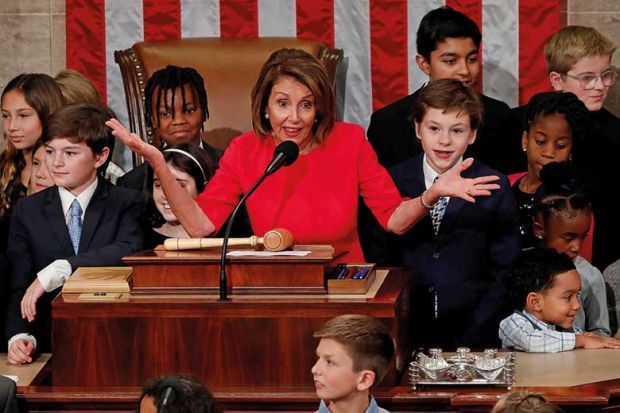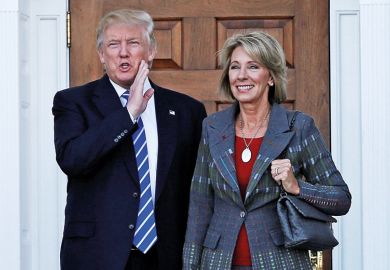The new US Congress has convened with newly empowered Democrats promising greater support for education, students and science, but decidedly unsure to what extent they can deliver it.
After two years of total Republican control in Washington, the House of Representatives assembled with Democrats holding a 235-199 advantage and promising pushback against a range of Trump administration policies.
Returning to the role of House speaker after eight years as the chamber’s minority leader, Democrat Nancy Pelosi placed increasing support for public education at the top of a list of her party’s agenda items.
The party’s plans in education and beyond, however, face obstacles not only from the White House and the Republican majority in the Senate, but also from some of Ms Pelosi’s fellow Democrats.
Fifteen Democrats declined to support Ms Pelosi’s candidacy as speaker in the formal floor vote, and while the rebellion was not enough to prevent her election, it foreshadowed potential limits on her bargaining authority from members who want even more aggressive efforts to pursue key social policy initiatives such as fee-free college study.
A key mechanism at issue is a provision known as “Paygo” – “pay as you go” – which requires Congress to immediately offset any rise in spending with a corresponding spending cut or revenue increase. Despite some vocal dissent beforehand, Democrats largely backed Ms Pelosi in reinstating Paygo as part of the House’s initial vote on its operating rules for the coming two-year session.
Ms Pelosi’s action was seen as a bid to demonstrate fiscal responsibility at a time of escalating federal budget deficits. But it could hamper the delivery of widely made Democratic campaign promises on topics such as reducing the crisis in college affordability.
Another major question for the divided Congress is whether it can find enough agreement to enact a broad reshaping of higher education policy. Democratic priorities for a new higher education act include creating options for debt-free college, expanding student loan forgiveness for those who take public sector jobs, and resuming an Obama-era crackdown on predatory for-profit colleges.
Some other likely provisions that might find an easier time accumulating bipartisan support include simplifying the process through which students apply for federal financial aid and improving data-sharing systems that are needed to better evaluate college performance.
Although Republicans still control the Senate, Democrats are optimistic that the leader of the Senate’s Education Committee, Lamar Alexander of Tennessee, could be especially motivated to find common ground on higher education reforms before his planned retirement in 2020.
Cooperative attitudes could be diminished, however, by Democrat promises to aggressively wield the formal investigative powers that they have reclaimed with the control of a chamber of Congress. Leading Democratic investigative targets in the world of higher education include the education secretary, Betsy DeVos, and her rollback of Obama-era civil rights protections, and the operators of for-profit colleges that collapsed and ended the study opportunities of thousands of students while lumbering them with large debts.
Register to continue
Why register?
- Registration is free and only takes a moment
- Once registered, you can read 3 articles a month
- Sign up for our newsletter
Subscribe
Or subscribe for unlimited access to:
- Unlimited access to news, views, insights & reviews
- Digital editions
- Digital access to THE’s university and college rankings analysis
Already registered or a current subscriber?








